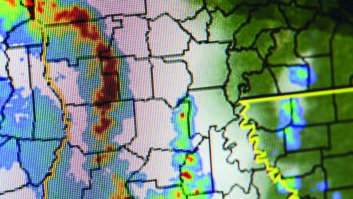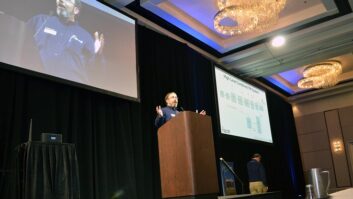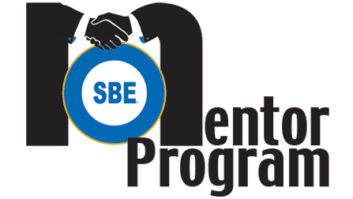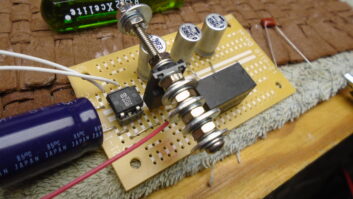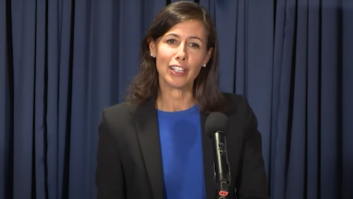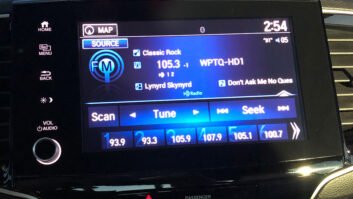She has packed up her four-foot-long price book; after three decades of selling broadcast equipment, Kathleen Karas is leaving the industry. It’s our loss.
(click thumbnail)
NPR Vice President of Engineering Mike Starling, center, accepts the C. Stanley Potter Award from Ben Martin, immediate past president of the International Association of Audio Information Services, and nominator Dave Noble of Sun Sounds of Arizona. The award recognizes contributions to the audio information industry.
Starling, a former member of the IAAIS board, was saluted for helping to represent its mission to the FCC and to the public radio system, his work “in protecting existing radio reading services from the potentially harmful effects of low-power FM” and with filings and pleadings for IAAIS with the commission. The association also noted that Starling’s work on the Tomorrow Radio project made provision for a “home” for radio reading services.
“Because he meant for reading services to be included in the plan from day one,” Noble stated, “the developers of the digital radio system at Ibiquity and manufacturers like Kenwood received clear messages that public radio and reading services were to move into the future of radio together. He has made it a part of his position inside public radio to ensure that audio information services will not be the stepchild of digital radio.”
Karas, most recently branch manager at Crouse-Kimzey of Annapolis, has sold her house on the Eastern Shore of Maryland; she is staying in Pennsylvania with family, then plans to buy a small RV, travel the country and take classes.
If you don’t know KK, too bad. She is one of the “old-school” broadcast salespeople, who know their clients by name and the sounds of their voices, who care about their customers’ pets and what kind of boats they have and when their kids were born.
Karas started in broadcasting with Belar. She was hired as a receptionist but her job evolved into customer service and beyond; one friend said she served as Arno Meyer’s right hand for several years.
She then worked for distributor David Green; she and her late husband George Fisher assembled the 10-pound “Green Book,” a catalog of equipment manufacturers in the form of a loose-leaf notebook of product data sheets, cart label samples and other neat stuff. Clients still remember the book and the company’s loyalty discount plan. Eventually the firm was sold and became Radio Resources; and Karas departed.
She joined Crouse-Kimzey in 1989 and says she chose it because of Mark Bradford’s integrity. Although it is based in Texas, she operated her branch in and around Annapolis, which she loves.
Bruce Blanchard, director of engineering for WSCL(FM) in Salisbury, Md., relied on Karas when he was helping to build the station 20 years ago. He described her as “wonderful, engaging, intelligent and friendly.” Blanchard said Karas was always competitive with prices. Beyond that, he cited “the knowledge that she seemed to possess – and if she didn’t know the answer, she’d get it for me.” Unfortunately, Blanchard said, that kind of salesmanship seems to be dying off.
“What I notice now is there’s a void,” he said about industry suppliers in general. Declining to point to specific companies, he said, “I don’t think (companies) are hiring people that are knowledgeable anymore. They’re hiring telemarketers … and they don’t have a clue. You could ask ‘Does that take XLRs, is that a balanced output?” and they have to get back to you.”
Our columnist John Bisset, himself an exceptionally supportive salesman, said, “If Radio World gives a ‘Best Customer Service’ award, it would go to Kathleen.” Karas, he said, also has been a friend to the Washington-area SBE.
On the day Kathleen e-mailed to let me know her plans, she wrote, “I’ve been packing up my price book today to ship to the salesman taking over my accounts. My accounts! I didn’t realize how hard it is going to be to not talk to these people again until now. Gosh, this hurts.”
How many radio salespeople would say it hurts to close up shop?
“I was working with people who loved what they were doing,” she said of her clients, “and you can tell. Radio is like that.”
Travel safely, KK, and keep in touch. We miss you already.

…
One of the benefits of my job is that I am able to help focus awareness on an organization that serves an important, little-noticed niche of radio: the International Association of Audio Information Services. I have served as a public director for IAAIS; although my contribution to the board has been limited by time and journalistic ethics, I pass along word of its work when I can.
My interest in radio reading services dates to my days selling SCA receivers and volunteering to read newspapers on tape for the visually impaired. Perhaps you know someone with diminishing sight – a parent, neighbor or friend who can no longer enjoy printed materials like newspapers, magazines, flyers and even voter information. IAAIS members are there to help.
Thus I’m delighted to tell you about the award given by IAAIS to Mike Starling. See the box on this page; and learn more about this fine group at www.iaais.org
…
Of sadder note is the passing of Dane Roach, who died in June in Emmetsburg, Iowa. He was 44.
We learned of his death from John Schad, his employer at Smarts Broadcast Systems. Schad, president and CEO, called Roach a pioneer in digital automation for radio.
“Dane Roach began his career in radio in New Mexico before joining The Management to help develop the Digital DJ System,” the company announced. “Roach later joined the staff of Smarts Broadcast Systems as chief technician on the Smartcaster System, a post he held until his death.”
I wanted to know more, so I contacted Schad.
“Dane was a visionary,” Schad told me. “He was working in a station in New Mexico when he first learned that computers could now produce audio; and he immediately saw the application to broadcasting. He pestered his way in to Pete Charlton’s operation, The Electric Works, on one of Pete’s first installs, and later came to work for us.
“He was one of these guys that worked best for you if you just gave him a desk and let him put his feet up and think,” Schad said. “From time to time ideas would pop out; and they were usually good ones.
“Dane helped steer our company away from mainstream computer interests such as the Windows operating system in order to allow us to build products that were a much better fit for broadcast operations. He was always on the lookout for new ways to make computers communicate with each other and new features that could be added to automation systems.
“He was one of the rare engineers who also had the insight to look at two different things and realize that they would work well together.”
Schad said Roach was involved in very early digital automation systems both with his company and with Charlton’s, and was installing systems before most broadcasters even knew of the existence of such automation.
“He did pioneering work in such areas as multi-tasking, such as recording while playing back; detecting relay closures from satellite networks; and designing computer-controlled switchers. In more recent years he has done considerable work on developments such as Linux-based systems, socket-based communications – allowing complex unit-to-unit communications over an Ethernet, LAN cable or the Internet – and many more deeply technical features that allow for faster and more reliable equipment.”
Roach also worked at stations in Texas and Michigan and briefly for TM Century in Dallas. He had a malignant brain tumor, Schad said. Roach leaves a wife, Koni Roach; he died on the eve of their 13th anniversary. The couple had no children. Donations to the American Cancer Society are requested in lieu of flowers.





